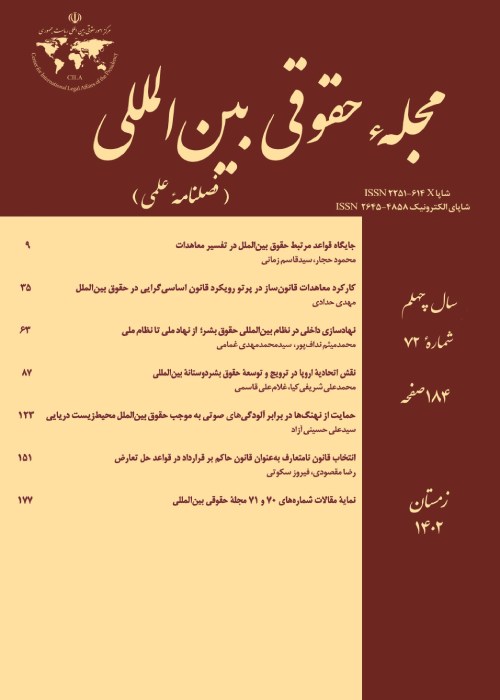Remedies For the Enforcement of the International Arbitral Awards
Author(s):
Abstract:
The fact that no state may benefit from its wrongful act, be it either commission or omission, is a well established principle of international law which originates from the fundamental principle of good faith.When states conclude a dispute settlement agreement and accept to refer a dispute to an international arbitration or judicial proceedings under bilateral or multilateral treaties, they are obliged to observe the outcome of the arbitration; otherwise, their international responsibility will be established. General rules of responsibility of states for the breach of international obligations shall be applied, should no specific rule has been stipulated between the parties. In the absence of such lex specialis, the international law prescribes new obligations especially for remedies for the breach of obligations by the state at fault.Non - compliance with the international arbitral or judicial awards by the states, is a good example of such wrongful act remediable under international law.By virtue of priority of the states, international obligations to their domestic laws from one side and their obligation orginating from international commitment on the other side, states may not rely on domestic law excuses as a ground for non-enforcement of international arbitral awards. The state which is in breach of its obligation to comply with an international judgments or international arbitral awards, is obliged to end its violation, mitigate the damages and finally to compensate the damages incurred by its wrongful acts. Compensation of the damages originated from non-compliance of arbitral awards may be effected through the following restitutions, taking into account, however, the possibility and proportionality, of each mechanism, i.e., financial compensation, obtaining injured state’s consent, proclaimation of the relevant wrongful act by the arbitral tribunal or international juridical court. However, compensation of damages incurred to a private person is usually met through the assessment of the actual damages and the loss of prospective profits incurred.In practice, the sum of payable compensation is usually made by mutual agreement of the parties, and sometimes based on an award on agreed terms issued by the relevant judicial body or arbitral tribunal on the basis of the parties request.
Language:
Persian
Published:
International Law Review, Volume:21 Issue: 31, 2004
Page:
201
magiran.com/p198860
دانلود و مطالعه متن این مقاله با یکی از روشهای زیر امکان پذیر است:
اشتراک شخصی
با عضویت و پرداخت آنلاین حق اشتراک یکساله به مبلغ 1,390,000ريال میتوانید 70 عنوان مطلب دانلود کنید!
اشتراک سازمانی
به کتابخانه دانشگاه یا محل کار خود پیشنهاد کنید تا اشتراک سازمانی این پایگاه را برای دسترسی نامحدود همه کاربران به متن مطالب تهیه نمایند!
توجه!
- حق عضویت دریافتی صرف حمایت از نشریات عضو و نگهداری، تکمیل و توسعه مگیران میشود.
- پرداخت حق اشتراک و دانلود مقالات اجازه بازنشر آن در سایر رسانههای چاپی و دیجیتال را به کاربر نمیدهد.
In order to view content subscription is required
Personal subscription
Subscribe magiran.com for 70 € euros via PayPal and download 70 articles during a year.
Organization subscription
Please contact us to subscribe your university or library for unlimited access!


